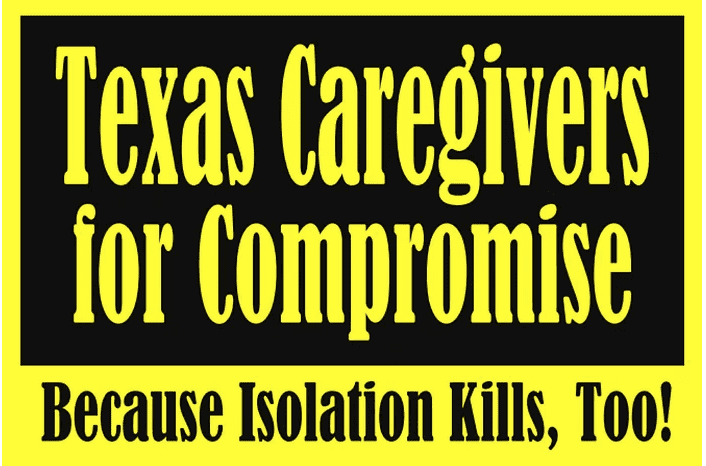Texas Caregivers for Compromise is an organization that arose during the 2020 COVID-19 shutdowns when families were denied access to their relatives in care facilities, such as nursing homes and state-supported living centers.
In an attempt to bring awareness to the detrimental effects of keeping families apart—especially when the individual in care is already vulnerable due to illness, disease, or age—Texas Caregivers for Compromise has been a powerful force in the Texas Legislature this year, advocating for a codified right for a person in a care facility to have an essential caregiver who cannot be turned away.
Senate Bill 25 and a Texas constitutional amendment, Proposition 6, were both passed this year to allow families to visit and advocate for their relatives in care facilities.
The founder of the Texas Caregivers for Compromise, Mary Nichols, created the organization after being denied access to her mother during the shutdowns.
“You would think with the constitutional amendments and Senate Bill 25 that was adopted, there would be nothing left to talk about,” said Nichols in an interview with Texas Scorecard. “But unfortunately, I think there was just not enough publicity around the constitutional amendment. And there are just facilities out there that still think they are autonomous and can allow visitors in as they choose.”
Despite the passage of these landmark pieces of legislation, care facilities throughout the state are still attempting to shut families out.
“I think education [for care facilities] is going to be key here,” said Nichols.
Whenever there are changes in legislation governing care facilities, it is the responsibility of the care provider to stay up to date on the legislation, not the responsibility of the state to inform the facilities. Therefore, the group argues, many of the facilities still attempting to halt family visits may be doing so illegally because they are unaware of the legal change.
According to Nichols, the first thing anyone should do if they run up against a facility denying rightful entry is to contact the Texas Long Term Care Ombudsman Program. “The ombudsman is a mediator, they have good rapport with the facilities here in Texas, and they know the guidelines and they usually can help resolve these things.”
The ombudsman will also report any violations to the Texas Health and Human Services Commission.
Nichols also recommends that Texans worried about being denied access carry a copy of the guidelines at all times. “You can walk in, hand them to your facility, and say, ‘These are the rules. I am entitled by state law and under the Texas Constitution to go in and see my mother or my husband or my daughter. Please don’t make me file a complaint.’”
In Nichols’ experience, most facilities will stop at the threat of the complaint and check for the new guidelines before allowing entry. They may also call Texas Health and Human Services for confirmation that they must allow a caregiver visitation.
If a facility still refuses to let a caregiver in, then filing the complaint with Texas Health and Human Services is the next step to ensure visitation.
However, after legislation passed the state Legislature and after Texas citizens approved a constitutional amendment, advocates are irritated that this is still an issue.
“I really was hoping that once Proposition 6 was passed, there would be not a lot left for me to do,” said Nichols. “We would be in maintenance mode, and we would not be required to advocate quite as aggressively as we’ve had to do over the last 20 months. But certainly, there’s still a whole lot more work for us to do. And as long as there are people not getting in to see their loved ones, as long as there are residents in long-term care facilities that are not being allowed [the] access that they’re entitled, then we’re not going away. Because there just aren’t family groups out there educated enough to help families understand what resident rights are with regard to visitation.”
The effects of shutdowns were measurable on patients in care. According to Nichols, “The statistic that I’ve seen is that there’s been a 40 percent increase in death due to what’s called ‘failure to thrive.’ But what that means is despondency, extreme weight loss, and rapid cognitive decline. Now, weight loss and cognitive decline go along with many of these diseases anyway, but these are accelerated due to just the loss of a will to live.”
Nichols says Texas Caregivers for Compromise will not be disappearing anytime soon and will continue to advocate for those in care and their families.





